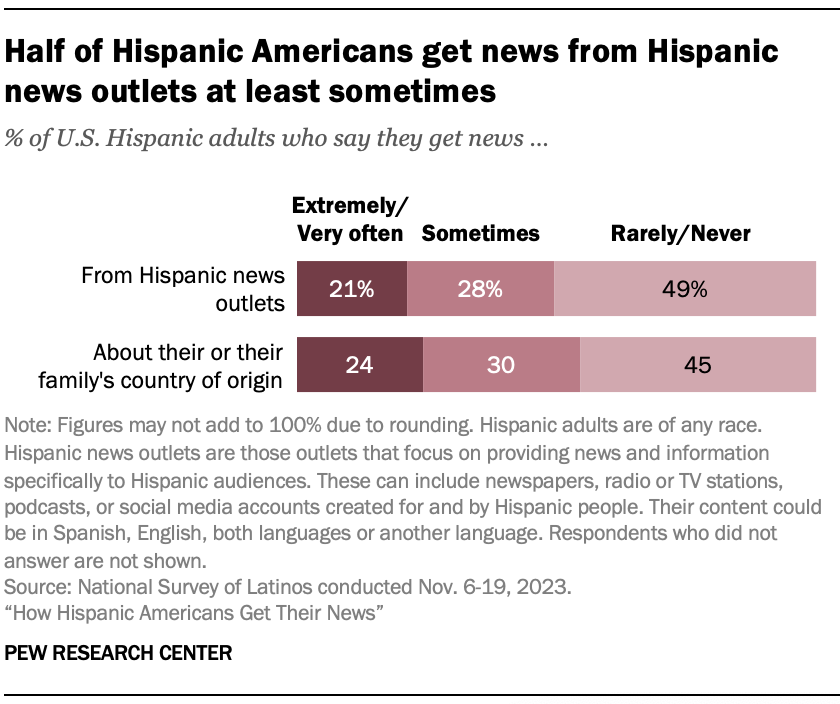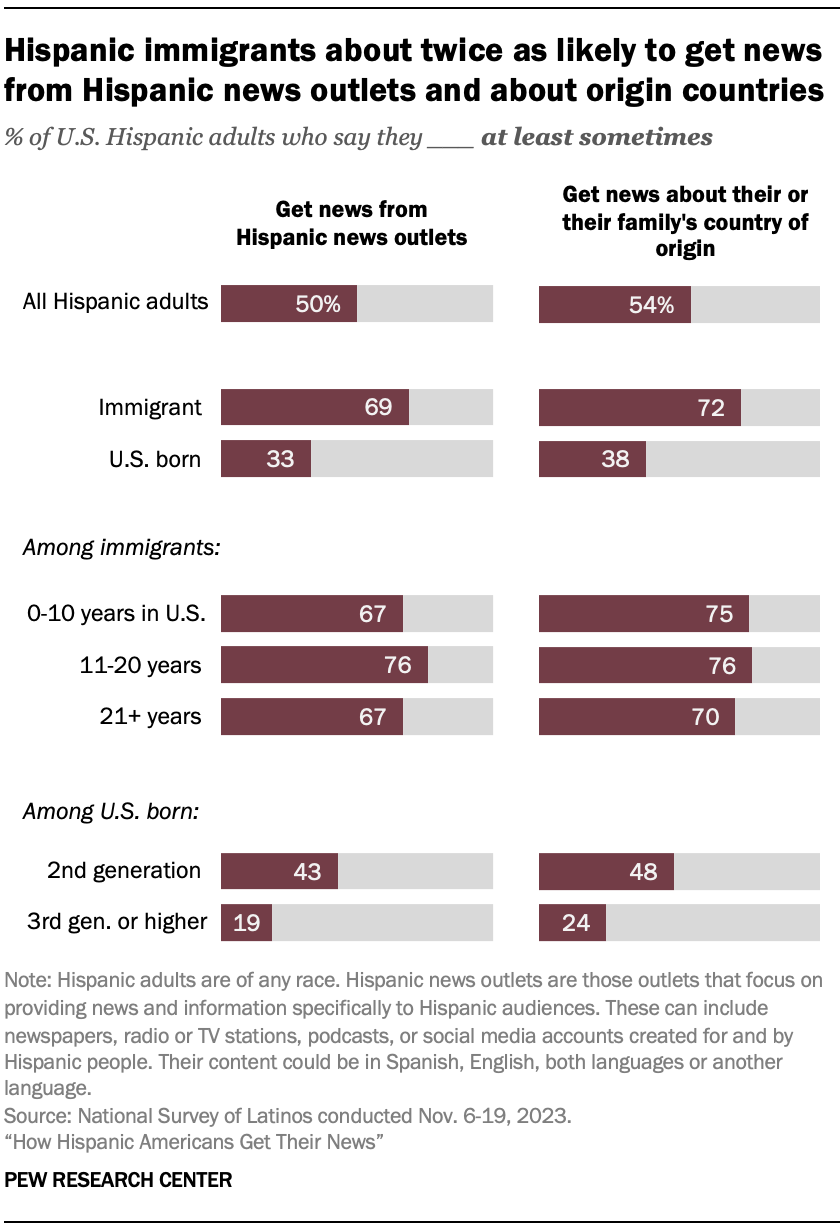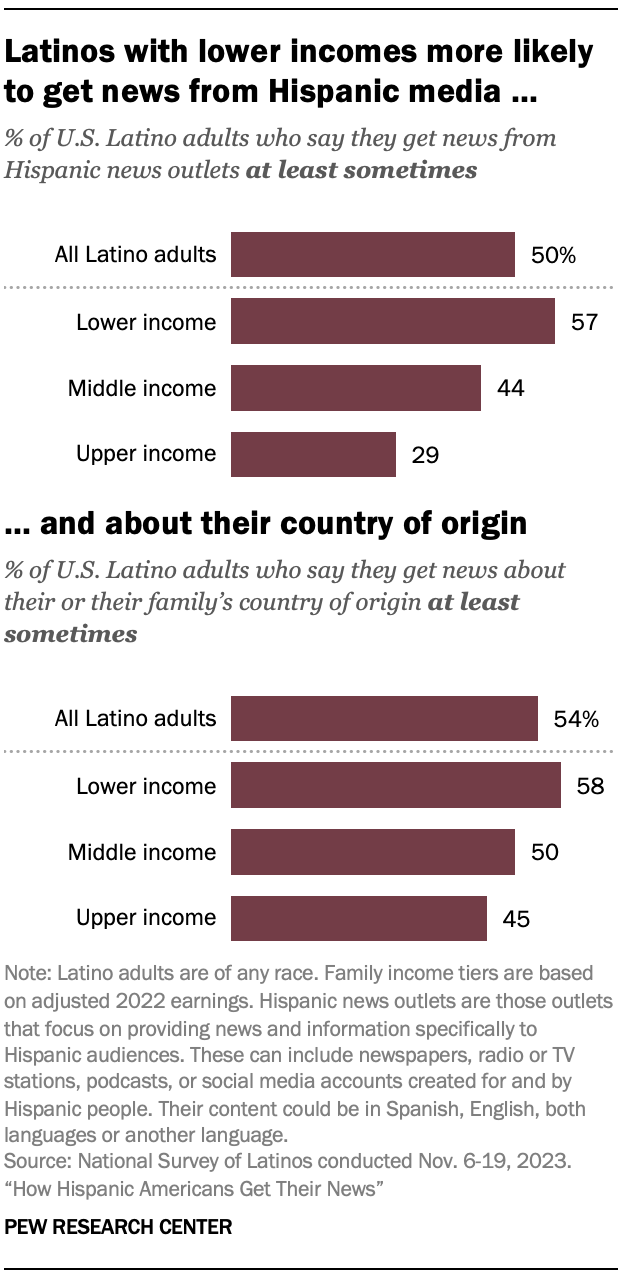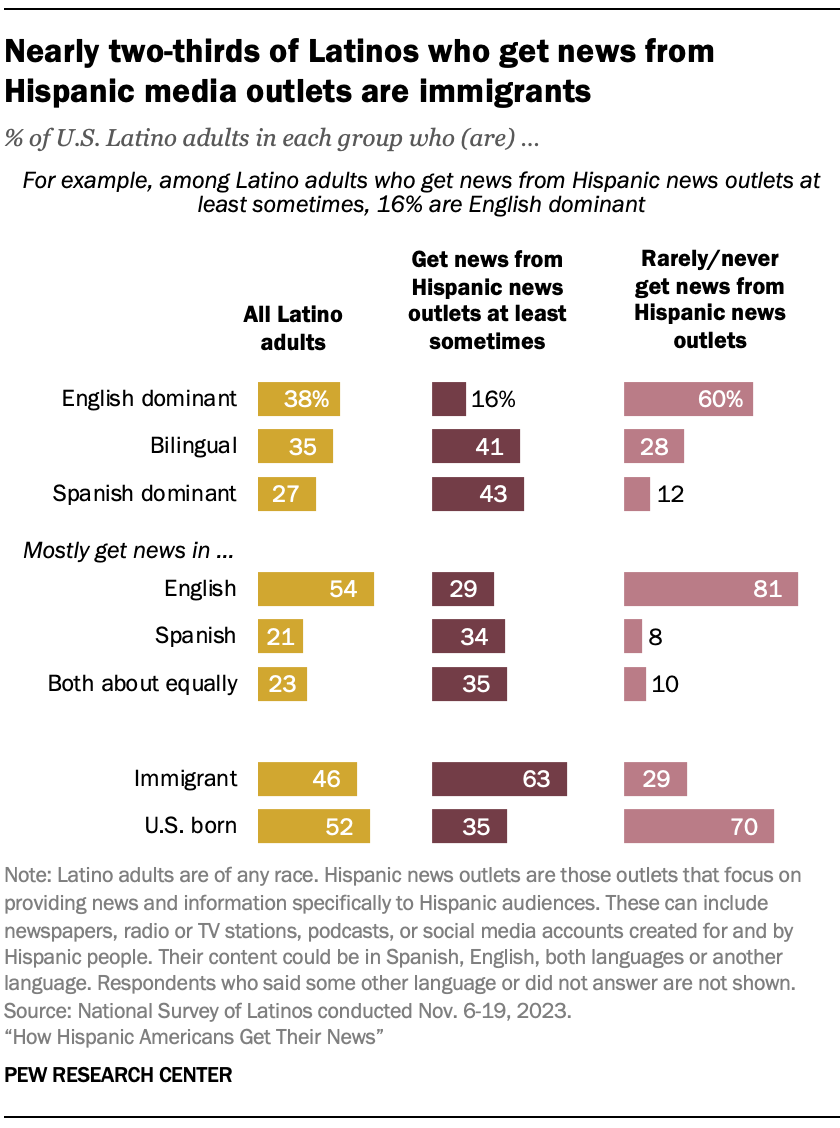
Half of Hispanic Americans say that they at least sometimes get news from Hispanic news outlets – outlets that focus on providing news and information specifically to Hispanic audiences, whether in Spanish, English or another language. This includes about 21% who say they get news from Hispanic news outlets extremely or very often.
Although the survey did not gauge respondents’ interaction with any specific Hispanic news outlets, a previous Pew Research Center study found that both of the largest Spanish-language television networks – Univision and Telemundo – have experienced declines in viewership in recent years, despite the continued growth of the U.S. Hispanic population.
Related: Hispanic and Black News Media Fact Sheet
The survey also asked U.S. Latinos, who trace their roots to many different countries, how often they get news about their country of origin or the country their Hispanic ancestors came from. Just over half of Latino Americans say they at least sometimes get news about their origin country, including 24% who do this extremely or very often.
U.S.-born Hispanics less likely to engage with Hispanic news outlets

Hispanic immigrants are roughly twice as likely as those born in the U.S. to get news from Hispanic outlets and to get news about their ancestral homeland.
- Hispanic news outlets: 69% of Hispanic immigrants say they at least sometimes get news from Hispanic news outlets, compared with a third of those born in the U.S.
- News about origin countries: 72% of Hispanic immigrants at least sometimes get news about their country of origin, versus 38% of U.S.-born Hispanics who say the same about their ancestors’ country.
The shares of Hispanic immigrants who get news from Hispanic outlets and news about their country of origin are relatively stable regardless of how many years they have been in the U.S. For instance, 75% of Hispanic immigrants who have been in the U.S. for 10 years or fewer say they get news about their country of origin at least sometimes, compared with 70% of those who have lived in the U.S. for more than 20 years.
However, there are differences among U.S.-born Latinos based on how long their family has been in the country. Second-generation Latinos (who have at least one immigrant parent) are about twice as likely as those who are third generation or higher (who have U.S.-born parents) to get news from Hispanic news outlets and news about their family’s country of origin.
- 43% of second-generation Latinos say they get news from Hispanic news outlets at least sometimes, compared with just 19% of Latinos who are third generation or higher.
- And nearly half of second-generation Latinos (48%) say they get news about their family’s country of origin at least sometimes, whereas only about a quarter of Latino Americans who are third generation or higher say the same (24%).
Latinos with lower levels of income more likely to get news from Hispanic outlets and about origin countries

Latinos who have lower incomes are more likely than those who have higher levels of income to get news from Hispanic media outlets and about their country of origin.
- While 57% of Hispanic adults with lower incomes say they get news from Hispanic media outlets at least sometimes, just 29% of upper-income Hispanic adults get news from these outlets.
- 58% of lower-income Hispanics say they get news about their ancestral homeland at least sometimes, compared with 50% among middle-income Hispanics and 45% among upper-income Hispanics.
Who gets news from Hispanic outlets and about origin countries?

We can also look at these questions from the opposite direction: For example, among Latinos who get news from Hispanic news outlets at least sometimes, how many mostly consume news in Spanish or English?
While Latino adults who get news from Hispanic outlets are generally similar to the overall Latino population in the U.S. in terms of age, gender and other demographic factors, they differ in some key ways: what languages they speak, in what languages they consume news and where they were born.
- Spanish-speaking Latinos, including those who are bilingual, make up the majority of the audience for Hispanic media outlets. About four-in-ten Latinos who say they get news from these outlets at least sometimes are predominantly Spanish speakers (43%), and a similar share are bilingual (41%). By contrast, among Latinos who rarely or never get news from Hispanic news outlets, a majority (60%) are predominantly English speakers.
- But news consumers of Hispanic media outlets are diverse in their language of news consumption. About a third of those who use these outlets at least sometimes (34%) get their news mostly in Spanish, while 29% get their news mainly in English and 35% consume news about equally in both languages. Latino adults who rarely or never get news from Hispanic outlets, meanwhile, overwhelmingly get their news in English (81%).
- Nearly two-thirds of Latinos who get news from Hispanic media outlets (63%) are immigrants. Among Latinos who do not get news from these outlets, 29% are immigrants.
Similar patterns arise when looking at those who get news about their or their family’s country of origin.
- 39% of Latinos who at least sometimes get news about their ancestral homeland are predominantly Spanish speaking, and a similar share (40%) are bilingual. Just 20% are predominantly English speaking. Among Latinos who rarely or never consume news about their origin country, 59% primarily speak English.
- 30% of Latinos who get news about their or their family’s country of origin mainly get their news in Spanish, while 38% get their news in English and 31% get their news in both English and Spanish equally. Latinos who rarely or never get such news, meanwhile, tend to consume their news in English (76%).
- 62% of Latinos who get news about their or their family’s country of origin are immigrants, compared with 27% among Latinos who rarely or never get news about their origin country.




